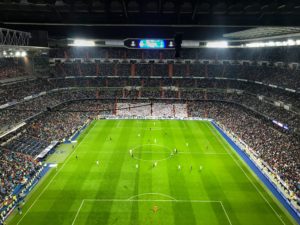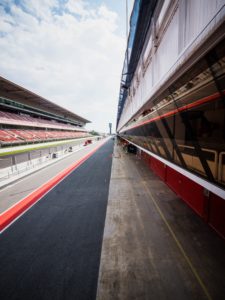
FIFA Green Card for the Planet
World Environment Day is celebrated annually on 5 June and is the United Nations’ principal vehicle for encouraging awareness and action for the protection […]


Every Breath Counts: join the race for clean air
World Athletics launches Every Breath Counts to call for urgent action on air quality. Global research shows that 75% of people want to tackle […]



El Tri to be carbon-neutral
The FMF announced it will offset all carbon emissions generated by the Mexican national team in the build up to and during Qatar 2022FMF […]


The Rolland-Garros commitment
The FFT has put sustainable development at the heart of its strategy as a federation and demonstrates this commitment at every event it organises. […]






LTA publishes landmark Environmental Sustainability Plan for tennis in Britain
We have today published an environmental sustainability plan, setting out the role we will play in securing a lasting future for tennis in Britain […]


The ISE is an online professional development academy for event industry professionals wishing to upskill in one of the most important recent advances in event management - sustainability.
ISE distilled decades of experience on the front line, building best-practice approaches to embedding sustainable practices into planning and delivery of events, and in using your powerful platform for good.
The ISE has been founded by Meegan Jones who is a seasoned event professional and pioneer in event sustainability practice.
Meegan Jones biography:
Taking the events she was working on as living labs, Meegan devised her own way of incorporating sustainability into her events work.
Right from the start, she recognised that bringing the sponsors, partners, suppliers, and attendees on the journey was absolutely key.
Her early work lead to a call to take on the role as the first dedicated full-time sustainability manager at major music festivals in the UK, where she got to bring her efforts to scale.
Meegan realised that this valuable learning needed to be shared with others as so few people were considering a sustainable approach to event production. She made the decision to document her processes.
Devised from her work at Peats Ridge Festival, Meegan created a 'model event' and then went on to author the Live Earth Green Event Guidelines, taking her place as an early leader in the field.
She has contributed to advancing industry knowledge through writing the UNEP Music and Environment Initiative Singing to a Greener Tune, and was a co-author of the research paper into festival travel impacts Jam Packed (Julie's Bicycle).
All culminating in the writing of what is now known as the industry bible, her book Sustainable Event Management: A Practical Guide. First published in 2009, and now in its third edition, Meegan draws on the lessons learned from hundreds of events over two decades and brings them to life in the Institute for Sustainable Events online training.




Clubs in the Bundesliga and Bundesliga 2 adopt sustainability criteria for licensing regulations for the first time
30 May 2022 – The Bundesliga and Bundesliga 2 have become the first major professional football leagues to include a binding sustainability guideline in […]


Over its 70 year history, F1 has pioneered numerous technologies and
innovations that have positively contributed to society and helped to
combat carbon emissions.
From ground-breaking aerodynamics to improved brake designs, the
progress led by F1 teams has benefitted millions of cars on the road today.
Few people know that the current hybrid power unit is the most efficient in
the world, delivering more power using less fuel, and hence CO2, than any other road car.
We believe that F1 can continue to be a pioneer for the auto industry,
working with the energy and automotive sectors to deliver the world’s first
net-zero carbon power unit, driving down carbon emissions across the
globe.
In launching F1s first-ever sustainability strategy, with an ambitious target
to be a net zero carbon sport by 2030, we recognise the critical role that all
organisations must play in tackling this global issue.
Leveraging the immense talent, passion and drive for innovation held by all
members of the F1 community, we hope to make a significant positive
impact on the environment and communities in which we operate.
Chase Carey
CIO of Formula 1
Click here to download the Sustainability strategy


We turn passionate outdoor people into climate advocates, working together to protect a future with clean air, clean water and a healthy planet.
Our History
Pro snowboarder Jeremy Jones was traveling to snow-covered places around the world when he recognized that snow was melting faster, temps were spiking and places he’d counted on for deep snow were no longer reliable. Something had to be done, but he couldn’t find any organizations or resources dedicated to mobilizing the snowsports community to act on climate. The outdoor industry—which these days supports 7.6 million jobs and creates $887 billion in economic revenue a year and is directly impacted by climate change—was doing little to address the issue.
So, in 2007, Jones founded Protect Our Winters, the first climate advocacy organization in the outdoor community. POW brought together other concerned athletes, creatives and brand partners to tackle the issue head on, a network that has since grown to 77,000 Team POW members. Our mission is to depoliticize the climate discussion and bring together those from all backgrounds to advocate for the outdoor spaces we love most.
The outdoor industry has the magnitude and economic influence to make change. But we can’t do it in isolation. Our tactic for engaging the 175 million Americans who say they love the outdoors? Remind them what they have to lose. It’s not just our powder days and clean air that’s at risk; it’s our livelihoods, our environment, our economy. We don’t have a day to waste.

IFs discuss sustainability, development and education initiatives at ASOIF Forum
Experts from 27 International Federations (IFs) governing Olympic summer and winter sports gathered this week at ASOIF’s Forum on Sustainability, Development and Education (ASDEG). […]
